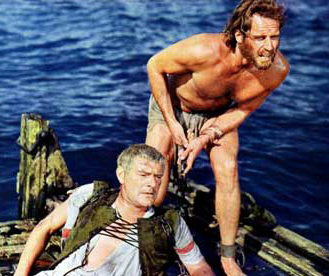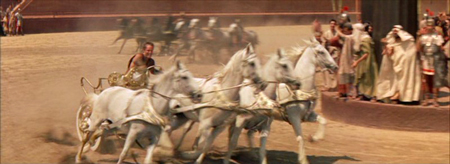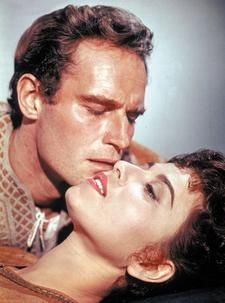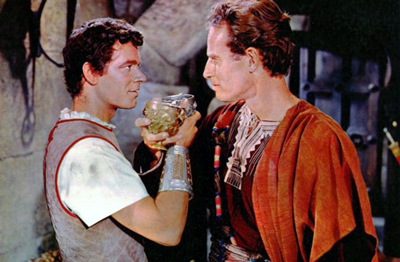
 |
|
|
|
Ben-Hur was big news in 1959. Colorful ads were up months before it arrived and it seemed to be in release forever, almost into 1961. I wonder if that created a marketing logjam for MGM's next 70mm offering, 1960's King of Kings. Since we never see Jesus' face in Ben-Hur, some enterprising editor could conceivably cobble together a 6-hour conflation of the two movies. Hey, the music would match well, as both scores are from the hand and baton of the great Miklos Rozsa. The years 1955 through roughly 1968 were the heyday of the grand Road Show epic, that exalted tier of movies presented in exclusive engagements, with reserved seats, overtures and intermissions. Theaters like the Warner Hollywood might play a Road Show attraction for months before it was finally printed in normal 35mm and put in general release. Going to one of these movies was a special occasion. I remember dressing up, with a bow tie. They sold souvenir books at the door, usually for a dollar. How the West Was Won was my first exposure to a genuine 'picture palace'. I couldn't find the restroom until a uniformed, gloved usher pointed to an elevator that delivered me to the enormous "men's lounge". 
Ben-Hur is perhaps the ultimate Road Show title. It lasts the better part of four hours, includes enormous set-piece action scenes and deals with a "big" topic, in this case, a Judean hero who happened to be present for several key moments in the life of The Christ. Governor Lew Wallace of New Mexico claimed not to be particularly religious when he started writing, but his 19th century publishing blockbuster novel lays down the template for all devout fiction to come: be reverent, be sentimental, and be violent. MGM's 1925 film version is rightfully considered a classic, a grandiose spectacle to out-do earlier Italian epics in size and scope. MGM in 1958 had split its production aims into two parts. "Ordinary" projects were subject to stringent budget tightening, and only a few pictures a year were allowed class-A status. The studio apparently funneled its bankroll into this lavish gamble in hopes of rescuing its sagging finances. A huge success, Ben-Hur not only pulled Leo back from the brink, it gave a huge boost to the Italian film industry. One of the most tasteful and sensitive directors from Hollywood's Golden Age, William Wyler was probably looking for a good retirement project. His sure hand guided the production into exactly the movie MGM wanted: big, bold and emotionally moving. Karl Tunberg's script is a smart update of the original, as opposed to the laughable pageant pap of C. B. De Mille. Judah Ben-Hur (Charlton Heston) is now a more complex character. He supports his people's opposition to the Roman occupation, but is himself a slave owner. His initial behavior toward Esther (Haya Harareet) is almost oily, what with his mention of the fact that not long ago his legal rights might have included the privilege of sleeping with her. "If only you would" appears to be Esther's unspoken but heavy-breathing reaction. These questionable entitlements are offset by Judah's loving relationship with his factor Simonides (Sam Jaffe) and the high measure of respect granted him by his mother (Martha Scott) and sister Tirzeh (Cathy O'Donnell). The tragic events that follow elevate our regard for Judah even further. His defiance, spirit and knack for survival win him a new father in Roman General Arrius (Jack Hawkins) and his skill with powerful horse teams make him the favorite of the Arab chieftains. Judah Ben-Hur surely becomes a man for all seasons, races and creeds. For a while there, he looks like a shoo-in for President of the United Mediterranean States, if such a thing existed. The Tribune in the ointment is Messala (Stephen Boyd), Judea's new Roman military leader. Messala makes friendly noises but expects Judah to betray his own people by naming names of those disloyal to Caesar. When Judah angrily refuses to fink on his friends, the ambitious Messala decides to make an example of him. 1 With his mother and sister dispatched to an unknown fate, Judah is sentenced to death as an oarsman on a Roman galley. Fortitude, determination and good luck turn his fortunes completely around. Yet a new status as a Roman citizen won't help Judah find his lost family members. To do that he'll have to return to Judea and face the now entrenched Messala. As it so happens, their chosen arena of combat is an enormous, brutal chariot race. 
That race comes at roughly the three hour-mark, or early in the second half of Ben-Hur. By that time we've already been knocked out by an exciting naval battle with Roman Tiremes, achieved through elaborate model work and traveling matte effects. Excepting a number of eye-popping moving matte shots, the chariot race is achieved through live-action filming by second unit director Andrew Marton and the legendary stunt whiz Yakima Canutt. We can tell that for many shots it's actually Heston and Boyd out there clashing, racing at speed. The horses never look sped-up and the stunts are particularly gory. No matter what 'cheating' was going on, it's clear that the two actors were in the thick of it. If one were to fall from his chariot, he'd almost certainly be injured by the teams of horses running directly behind. We feel this physical immediacy in the chariot race, and it's a feeling that the movies have lost. (Insert generic anti-CGI rant here.) Today, of course, we wonder why the rules permit Messala to outfit his chariot with tire-ripping 007 wheel hubs - one would think that several horses would have been mangled by those cutters during filming. Judah's warm relationship with his horses, all named after stars, reminds me why young girls in the early 1960s loved Ben-Hur. They were crazy about horses too, and Heston happily nuzzles with his matching quartet of white chargers as if they were gentle puppies. Keeping Ben-Hur on its emotional rails and guiding it around the pitfalls of lame faux-Biblical epics is the wise director William Wyler, fresh from two noted pacifist epics, the Civil War show Friendly Persuasion and the range war western The Big Country. Ben-Hur also counsels peace, when Esther finally persuades Judah to give up his vengeance against Rome. With his personal grudge already resolved in the circus, Judah's most defiant act is to return Arrius's ring, renouncing his identity as a 'galvanized' Roman. Those empire-building bigots back on the Tiber just don't respect Judea's demand to keep its own national identity. This brings us to the Biblical content of the story, the "hook" that author Wallace so cleverly worked into his tale. So long as he maintained respect for his Christian readers, Wallace could interweave Judah's destiny with that of the Christ without giving offense. It worked, as the book Ben-Hur became practically a second Bible in many homes. Jesus gives Judah water when he's dying of thirst. Later, an unhappy Judah doesn't hang around to hear the Sermon on the Mount. Finally, as Jesus struggles through town toward his crucifixion, Judah realizes that he's the same man who helped him five years before. William Wyler handles all of this with remarkable good taste. He films familiar Bible tableaux (the sermon, the trial) from a distance and doesn't oversell any of the reverent moments. Author Wallace's big finale, retained for all versions of Ben-Hur, is the only divisive element in the movie. After four hours of a realistic ancient world, we're given a full-on miracle. No matter how you cut it, the miracle (I won't divulge its exact nature) is directly related to Judah's relationship with the Son of God. Personally touched by Jesus, Judah is shaken and inspired. Wyler's direction and Heston's performance are so good, that the potential offensiveness of this (presuming on holy scripture) is largely neutralized. Judah is present for the crucifixion, and can honestly say, "I knew him when." What isn't neutralized is the implied object lesson for Jews. King of Kings gives the Christian version of events from a Christian viewpoint, for a Christian audience. Fair enough. Ben-Hur follows the Jewish experience in the days of Jesus, and its eventual message seems to be that Jews can only find true happiness by embracing Jesus Christ. Even given the story's subtitle -- "A Tale of the Christ" -- I've always been surprised that Jews are not offended by this. Ben-Hur is Charlton Heston's biggest career role, the one that cemented him as the go-to guy for period picture heroes. Not the most humorous of personalities, Heston joked endlessly on Johnny Carson about playing Moses, and much later in his political career tried to act the part in real life. But that bearded waxwork with the big voice can't hold a candle to the flesh, blood & sweat Judah Ben-Hur. Heston is perfect for the role because he's big and lanky and physical, yet no monument to physical force. Bruises and wounds have a real effect on him. Ady Berber's Maciste- like Malluch easily blocks Judah's way. Can you picture John Wayne being knocked on his tail in a similar situation, and just taking it? Something self-effacing from Heston's relatively modest personal background is in there too -- he can approximate humility in a way shared by few Hollywood stars. 3 
Haya Harareet gives her one lasting performance here, oozing suppressed passion for the mighty Judah. Martha Scott and Cathy O'Donnell are saddled with roles that seem fit for a much less sophisticated drama. Stephen Boyd has perhaps his best role as Messala, a preening, calculating corporate climber. Messala has always seemed more interesting than the typical villains in Biblical epics and/or sword 'n' sandal pictures. The other major character actors are brash and colorful. The older names (Hugh Griffith, Finlay Currie, Frank Thring) are happy hams in showcase roles, and Sam Jaffe is wonderfully modulated as the faithful retainer. I just wonder how Simonides kept Judah Ben-Hur's fancy home intact for the five years that its owner was The buzz over the past few years is that Gore Vidal talked William Wyler into inserting a homosexual subtext into the relationship between Judah and Messala. Thus their spirited meeting and exchange of affection is now commonly interpreted as a coded series of flagged actions -- specific lines, specific physical gestures and eye motions -- that indicate an old secret relationship. As the underside of their scenes is already crowded with the unspoken political conflict and Messala's expectation of getting Judah's cooperation with his hunt for Judean traitors, the controversy seems unnecessary, a distant sidebar to the film's main themes, and a parlor game for revisionists. 4 Warner Home Video's 50th Anniversary Ultimate Collector's Edition Blu-ray of Ben-Hur is the high-quality HD presentation we've been waiting for, in ritzy display box packaging that will make it an easy-decision holiday gift. The transfer is quite wonderful, as Blu-ray's resolution can finally yield a worthwhile image from the ultra-wide, slightly compressed "Camera 65" format. An older, pricey laserdisc looked pretty but human faces were barely readable even at medium distances. We're told that this new encoding began with an 8K scan of the original 65mm camera negative. The painstaking restoration took longer than expected, which is why the 50th Anniversary disc has become a 50th + 2 celebration. 5 Color, sharpness and detail are excellent here, and the added stability (how come nobody stresses this Blu-ray plus factor?) reminds us of the rock-steady 70mm images that thundered across the giant Road Show screens way back when. The Soviets may have been first putting men in space, but Hollywood had already won the giant-screen race, hands-down. The rich multi-track audio features Miklos Rozsa's bombastic music score, which bolsters the film's 'giant' quality and adds distinction to the devout passages. It matters not that the maestro's movie themes are so similar -- when I try to recall the Ben-Hur title tune I invariably come up with the fanfare from Ivanhoe. But there's no denying Rozsa's contribution when we get to the intimate scenes. The composer's love themes add meaning and depth to Haya Harareet's longing stares, and enhance Heston's impossibly blue-eyed close-ups. Ben-Hur is not a picture where we wish the music would go away. The feature is spread across two Blu-ray discs to maximize image quality. It comes with a full commentary laced with Charlton Heston's observations and memories. A set of original trailers are included on these discs as well. The first thing up on the third disc is an encoding -- said to be in SD -- of the 1925 Ben-Hur: A Tale of the Christ with Ramon Novarro. The naval battle and the chariot race are almost as impressive as those in the remake. The dozens of extras leaping from a burning galley into the open ocean certainly looks dangerous. The chariot race duplicates most of the events of the later film, without details like Messala's wheel hub weapons. One other difference is the messy chariot pile-ups: on just a casual look-see, it seems obvious that a number of horses are badly injured. A 1979 docu by Kevin Brownlow pointed out an assistant director running across the dirt after one of these collisions, but I didn't spot him this time. 
The new extras for this release are sourced from the Charlton Heston family and his son Fraser, several of whose movies have been appearing from Warners in the past year. The feature-length HD docuA Personal Journey makes extensive use of Lydia Heston's home movies to tell the story of Charlton Heston's life, his relationship with his family and his work on Ben-Hur. A lot of backstage activity is recorded on these 16mm home movies, which are in very good shape. The home movies support the portrait of Heston communicated in his first book of diary entries, back in the 1970s. The actor was a consummate professional. Just before Ben-Hur Heston took what another star might see as a risky demotion to secondary player status for Wyler's The Big Country. His character is arguably the freshest in the movie. Inside the handsome display box, embossed with images of those huge stone figures in the center of the chariot track, are two quality publications. One is a larger-than-normal picture & quote book celebrating the movie, with stills, reproductions of artwork and reprints of the original press book. The second book is a fancy reproduction of Heston's Ben-Hur Diary, duplicating his very legible writing, and even including several "taped in" notes to make it seem all the more authentic. It's gimmicky, but for those who can get enough of Heston, it's fine. Warners went the all-Heston route with this 50th anniversary box and certainly came up with more than enough good content: don't you wish your favorite actor/movie was documented with as much behind-the-scenes film footage? What this means is that director William Wyler's part in the story seems much smaller. There's surely a good docu to be made about this amazing director's career. Heston was the star but Wyler elevated Ben-Hur way above the norm for Biblical epics. He even took on the role of producer when the credited Sam Zimbalist passed away in the middle of production. What was it that made Wyler more effective than the equally talented Joseph L. Mankiewicz, who concurrently ran into nothing but grief, heartache and failure trying to do the same thing for a another Rome-based epic, for 20th-Fox?
On a scale of Excellent, Good, Fair, and Poor,
Ben-Hur Blu-ray rates:
Footnotes:
1. I promised not to make any outright cynical remarks, but... considering the way the Ben-Hur family gets into hot water with the new governor of Judea, I'd think that the movie could be repurposed as a compelling advertising statement, reminding viewers that they should consult a good ROOFER now and then. If only Judah had maintained those crumbling roof tiles... or kept his clumsy sister downstairs.
3. Confession #2: watching Ben-Hur in a 1960s reissue, the face that popped out at me immediately was the bald, imposing Austrian actor Ady Berber. Why? Berber's picture was plastered all over issues of Famous Monsters magazine as the star of a movie called The Dead Eyes of London. I wasn't sharp enough to spot Hammer icon André Morell, however.
4. I may minimize the assertion of Gore Vidal, but I believe something similar may have happened with Sam Peckinpah and Charlton Heston on Major Dundee. Heston plays the main character Amos Dundee as a troubled hero, but Peckinpah's script and direction undercuts the Dundee character all the way, as if the director secretly planned to undermine the 'American Epic" and its heroic icon, without Charlton Heston even being aware of it.
5. It's a 65mm scan, but the main titles bear a prominent credit for Technicolor, which did not make 65mm dye-transfer prints. The credit probably reflects the Rome Technicolor lab and the 35mm Tech prints that would follow.
Reviews on the Savant main site have additional credits information and are often updated and annotated with reader input and graphics. Also, don't forget the 2011 Savant Wish List. T'was Ever Thus.
Review Staff | About DVD Talk | Newsletter Subscribe | Join DVD Talk Forum |
| ||||||||||||||||||